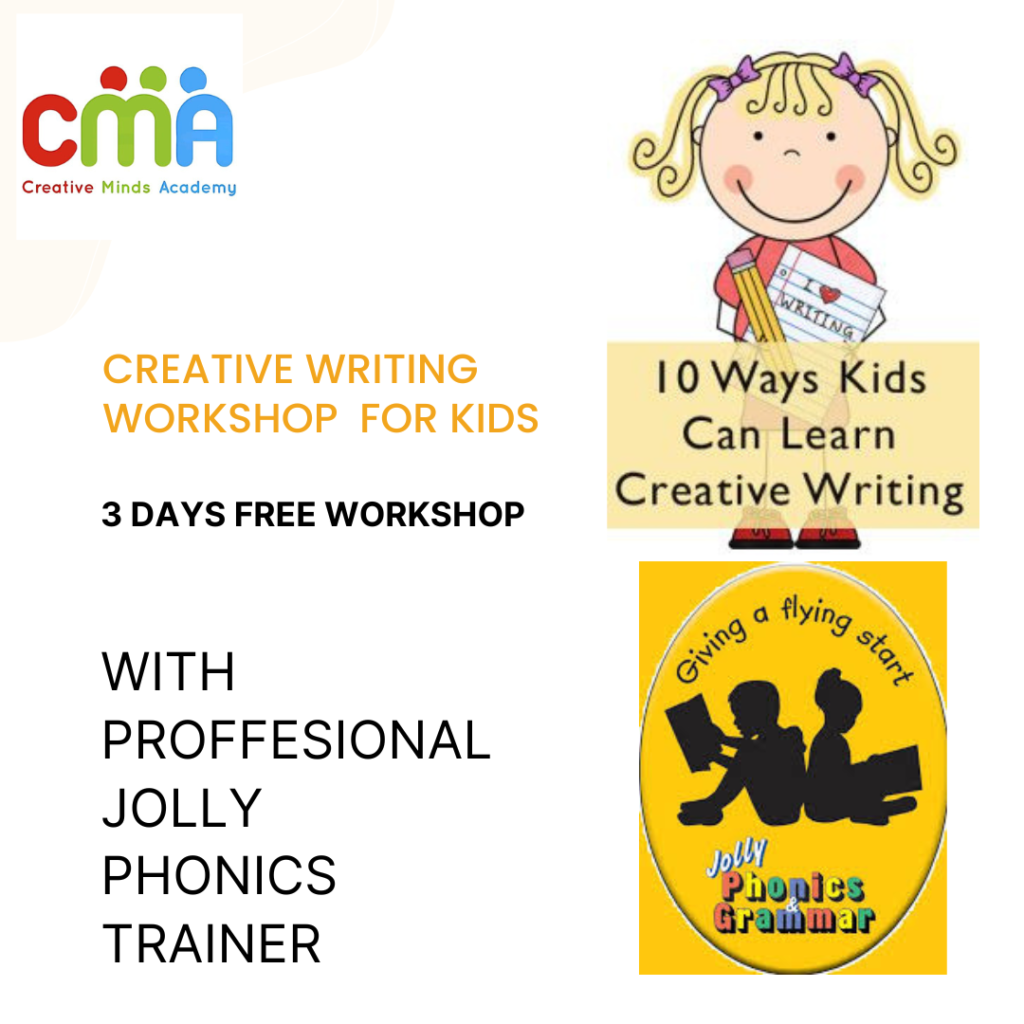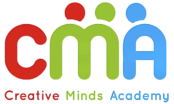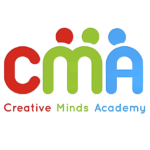Top 10 ideas to start Creative Writing Classes For Kids

Are you looking for ideas to start creative writing classes for kids. Here are some of the best ways to develop writing skills in children. (Don’t forget to read the last tip)
Story Starters: Encourage children to come up with their own stories by providing them with prompts or story starters. These can be simple prompts like “Once upon a time, there was a talking animal…” or “In a faraway land, there lived a wizard who…”
Draw and Write: Have children draw a picture, then write a short story about what is happening in the picture. This helps children to develop their imagination and creativity.
Word Games: Play word games with your child, such as “I Spy,” “Hangman,” or “Word Scramble.” These games can help improve vocabulary and spelling skills, as well as foster creativity.
Poetry: Encourage children to write poetry by introducing them to different types of poems such as haikus, limericks, or acrostics. Give them a theme or topic to write about, and let them explore their creativity.
Collaborative Writing: Write a story or a poem together with your child. Take turns coming up with ideas and writing sentences. This helps children to learn how to work with others and develop their writing skills.
Writing Prompts: Use writing prompts to spark your child’s imagination. You can find prompts online, in books, or create your own. Encourage your child to write freely without worrying about spelling or grammar.
Journaling: Encourage children to write in a journal regularly. This can be a fun way to express their thoughts, feelings, and experiences. You can also provide prompts or ask questions to inspire them.
Create a Character: Have your child create a character and write a story about their adventures. This allows children to use their imagination and develop their writing skills.
Play Pretend: Encourage children to use their imagination by playing pretend. You can suggest different scenarios or provide costumes and props. Afterward, have them write a story about their imaginary adventure.
Rewrite a Story: Have children rewrite a favorite story or fairy tale with a different ending or new characters. This helps children to think creatively and develop their writing skills.
Encourage your children to give detailed description by speaking or writing very precisely. Avoid using the word very but try to find synonyms. Teach them figure of speech.
Figure Of Speech - Which figure of speech we can teach to small kids?
Here are some simple figures of speech that small kids might understand:
Simile: A comparison using “like” or “as.” For example, “Her eyes are as blue as the ocean.”
- Her eyes are as bright as the sun.
- He runs as fast as a cheetah.
- The water is as clear as crystal.
- His hair is as black as coal.
- She sings like a bird.
- The house is as cold as ice.
- The baby’s skin is as soft as a feather.
- His voice is as deep as the ocean.
- The flowers are as pretty as a picture.
- He is as tall as a tree.
Metaphor: A comparison that doesn’t use “like” or “as.” For example, He’s a real teddy bear.
- Her eyes are windows to her soul.
- Life is a journey, enjoy the ride.
- The world is a stage, and we are all actors.
- Time is money.
- The classroom was a zoo.
- His heart is a stone.
- The sun is a golden ball in the sky.
- She has a heart of gold.
- The wind is a wild and playful creature.
Hyperbole: An exaggeration used to emphasize a point. For example,
- I’m so hungry, I could eat a horse!
- I have a million things to do today.
- I’ve been waiting for ages.
- This bag weighs a ton.
- I’m so tired, I could sleep for a week.
- He’s as old as the hills.
- My backpack is as heavy as a boulder.
- She’s got eyes in the back of her head.
- He’s the slowest runner in the world.
- I could hear him from a mile away.
Onomatopoeia: Words that imitate sounds. For example,
- The clock goes tick-tock, tick-tock.
- The dog says woof-woof.
- The cat says meow.
- The phone goes ring-ring.
- The thunder rumbles and goes boom.
- The bee buzzes.
- The owl hoots.
- The snake hisses.
- The car honks.
- The water drips and goes drip-drop.
- The frog croaks.
- The wolf howls.
- The chicken clucks.
- The horse neighs.
- The duck quacks.
- The pig oinks.
- The lion roars.
- The turkey gobbles.
- The sheep bleats.
- The snake rattles.
- The whale sings.
- The donkey brays.
- The bird chirps.
- The elephant trumpets.
- The fly buzzes.
- The seagull squawks.
- The train goes chugga-chugga, chugga-chugga, chugga-chugga, woo-woo!
- The mouse squeaks.
- The cricket chirps.
- The chainsaw goes buzz.
- The bee goes bzzz.
- The vacuum cleaner goes whirr.
- The guitar goes strum.
- The zipper goes zip.
- The crowd cheers and goes hooray!
- The water splashes.
- The fire crackles.
- The scissors go snip-snap.
- The clock goes tick-tock, tick-tock.
- The wind goes whoosh.
- The leaves rustle.
- The car screeches.
- The baby coos.
- The water flows.
- The saw goes rrrrrrr.
- The hammer goes bang.
- The typewriter goes clack-clack.
- The popcorn pops.
- The ice crackles.
- The pencil scribbles.
Alliteration: Repeating the same sound at the beginning of words. For example,
- Peter Piper picked a peck of pickled peppers.
- Sally sells seashells by the seashore.
- Big brown bears bask in the sun.
- Sammy snake slithers silently.
- Fuzzy fur flew as the ferret ran.
- Crazy cats cavort in the courtyard.
- Silly Sally sings songs on Saturdays.
- Tilly Tiger takes toys to the treehouse.
- The sleepy sloth slowly slides on the slimy branch.
- Bobby bought a bright blue bicycle.
- Mickey Mouse made many movies.
- Betty bought butter but the butter was bitter.
- The busy bees buzzed by the blossoming flowers.
- Danny’s dad drove a dusty Dodge.
- The friendly frog frolicked in the fresh water.
- Happy hippos hop happily in the water.
- Larry the lion licked his lips at the thought of lunch.
- Mighty Mike made a mess in the mud.
- The noisy neighbors never stop talking.
- Polly planted pretty purple pansies.
Personification: Giving human qualities to non-human things. For example,
- The wind whispered secrets in my ear.
- The sun smiled down on us.
- The flowers danced in the breeze.
- The leaves rustled and whispered to each other.
- The car groaned as it climbed up the steep hill.
- The tree stretched its branches towards the sky.
- The ocean waves danced and played.
- The moon winked at me from behind the clouds.
- The raindrops tapped a gentle rhythm on the roof.
- The clock ticked away the minutes.
- The thunder growled angrily.
- The pencil eagerly awaited its turn to be used.
- The fire crackled and popped.
- The book lay open, waiting to be read.
- The blanket wrapped me in a warm embrace.
- The old house creaked and groaned as if it were alive.
- The fog crept in on little cat feet.
- The sunflowers followed the sun as if it were their guide.
- The snowflakes danced and twirled in the air.
- The mirror reflected a distorted image.
Idiom: A phrase that doesn’t mean what it says literally. For example, “It’s raining cats and dogs.”
- A piece of cake (meaning: something that is very easy to do)
- Break a leg (meaning: good luck)
- Hit the nail on the head (meaning: to be correct)
- When pigs fly (meaning: something that is unlikely to happen)
- Don’t count your chickens before they hatch (meaning: don’t make assumptions about the future)
- Hold your horses (meaning: to wait and be patient)
- A taste of your own medicine (meaning: to experience the same thing you have caused to others)
- In the doghouse (meaning: in trouble or out of favor)
- Cry over spilt milk (meaning: to regret something that has already happened and cannot be changed)
- Under the weather (meaning: feeling ill or unwell)
- Out of the frying pan and into the fire (meaning: to go from a bad situation to a worse one)
- Barking up the wrong tree (meaning: to make a mistake or pursue a false lead)
- Butterflies in my stomach (meaning: feeling nervous or anxious)
- A penny for your thoughts (meaning: asking someone what they are thinking)
- The early bird catches the worm (meaning: the one who acts early gets the advantage).

